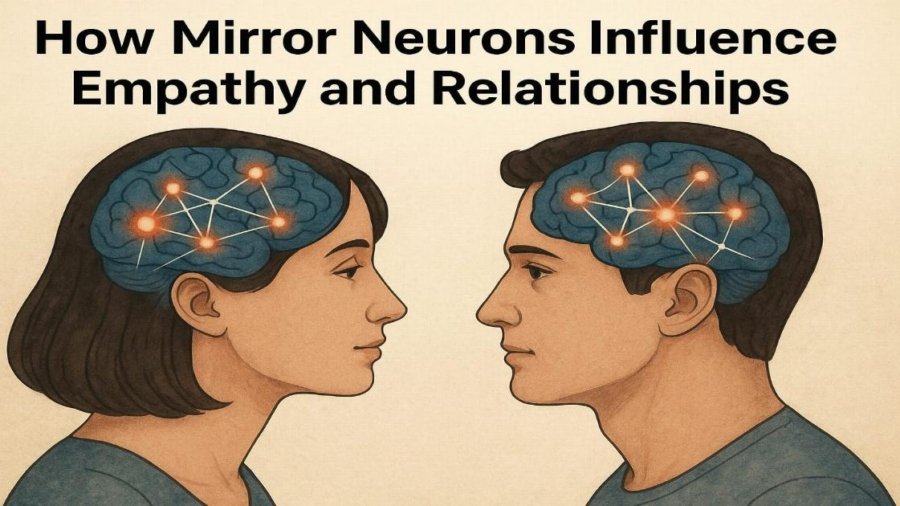In a world increasingly marked by disconnection, there is something deeply human about feeling another person’s joy—or their pain. This intuitive emotional resonance, the unspoken understanding we often take for granted, begins not in the heart but in the brain. At the center of this quiet yet powerful process is a network of cells known as mirror neurons. They are tiny connectors that may shape how we build trust, offer compassion, and experience love.
What Are Mirror Neurons and Why Do They Matter?
Mirror neurons are specialized brain cells that activate both when we perform an action and when we observe someone else performing the same action. They were first identified in primates and later observed in humans through neuroimaging. These neurons provide a biological foundation for imitation, emotional contagion, and social learning.
According to a review in Trends in Cognitive Sciences, mirror neurons play a key role in both action recognition and emotional resonance. They allow us to intuitively grasp what others are feeling or intending just by observing their behavior.

The Neuroscience Behind Empathy
Empathy is not a singular experience but a spectrum ranging from basic emotional mirroring to complex perspective-taking. Research from Social Cognitive and Affective Neuroscience reveals that distinct mirror neuron pathways are activated when observing social actions versus non-social ones. This suggests that our brains are specifically wired to understand and emotionally respond to others.
These neurons do not work alone. They interact with areas of the brain associated with emotional processing, such as the anterior insula and the limbic system. This integration helps explain why seeing someone cry can evoke sadness within us, or why witnessing joy can lift our spirits.
In some individuals, like those with mirror-touch synesthesia, mirror neurons may be hyperactive, causing them to physically feel what others are experiencing. As highlighted in recent neurological studies, this condition illustrates the powerful intensity with which some brains simulate others’ sensations.
How Mirror Neurons Shape Relationships
Relationships thrive on understanding and attunement—two capacities mirror neurons significantly influence.
When you watch your partner yawn and feel compelled to yawn yourself, or when a friend’s sorrow brings tears to your eyes, these are subtle signals of mirrored neural activation. This unconscious mimicry is essential in creating rapport, trust, and emotional safety. Christian Keysers, a pioneer in this field, has shown how the same neural pathways used to sense our own bodily states are activated when we observe others, enhancing our ability to connect emotionally.
Key Relationship Benefits of Mirror Neuron Activity:
- Enhances emotional attunement
- Builds non-verbal communication cues
- Strengthens trust and emotional validation
- Supports co-regulation during distress
In relationships, especially with children, this mirroring helps scaffold their emotional development. In the article “How to Teach Empathy to Your Children”, PsycheShare explores how emotional modeling—parents reflecting calm or compassion—lays the groundwork for lifelong empathic skills.

Mirror Neurons and Emotional Intelligence
Mirror neurons do more than reflect; they inform the deeper skill of emotional intelligence (EQ). When you recognize and respond to someone else’s emotional state, you are activating both the cognitive and affective dimensions of empathy. This process, fundamental to EQ, is increasingly critical in workplaces, friendships, and digital spaces.
The post “Why Emotional Intelligence Is the Skill You Need in 2025” explains how empathy is not a passive trait but an actionable ability—one that mirror neurons help initiate but that conscious effort must sustain.
This link between brain and behavior means emotional intelligence is not just about understanding others—it is about practicing the pause, attuning to subtle cues, and choosing relational responsibility.
How Do Mirror Neurons Influence Empathy
Empathy is not always verbal. Sometimes, it flows through gesture, dance, or physical proximity. Mirror neurons fire intensely during coordinated movement, helping people feel seen, synchronized, and emotionally bonded. Whether you are clapping in rhythm with others, mimicking a yoga pose, or dancing with a partner, these shared actions activate neural mirroring.
In “Why Dancing Is Good for the Mind and Soul”, PsycheShare shows how synchronized movement can deepen connection, reduce stress, and foster emotional healing. All this through the subtle, embodied activation of mirror systems.

Can Mirror Neurons Be Trained?
While we are all born with the potential to mirror, experiences shape how we access and express empathy. Trauma, neglect, or chronic disconnection can inhibit mirror neuron development or responsiveness. However, studies suggest that empathy can be nurtured through mindfulness, compassion training, and sustained emotional engagement.
Practical ways to engage your mirror neuron system more meaningfully include:
- Practice active listening: Maintain eye contact, reflect expressions, and validate emotions.
- Engage in synchronized activities: Dance, walk, or breathe together to foster emotional harmony.
- Observe nonverbal cues: Pay attention to tone, posture, and micro-expressions.
- Use compassion practices: Loving-kindness meditations have been shown to enhance empathetic capacity.

Final Thoughts: Empathy Is Wired Into Us—But Must Be Lived Out
Mirror neurons remind us that empathy is not simply a virtue but a natural part of our neurological makeup. They allow us to feel with others before we even speak. Still, empathy is more than a reflex—it is a choice.
Whether in parenting, partnership, or the public square, we must cultivate the relational muscles that mirror neurons activate. Because when we choose to see and feel with others, we are doing more than understanding. We are healing, bonding, and becoming more fully human.



Add a Comment